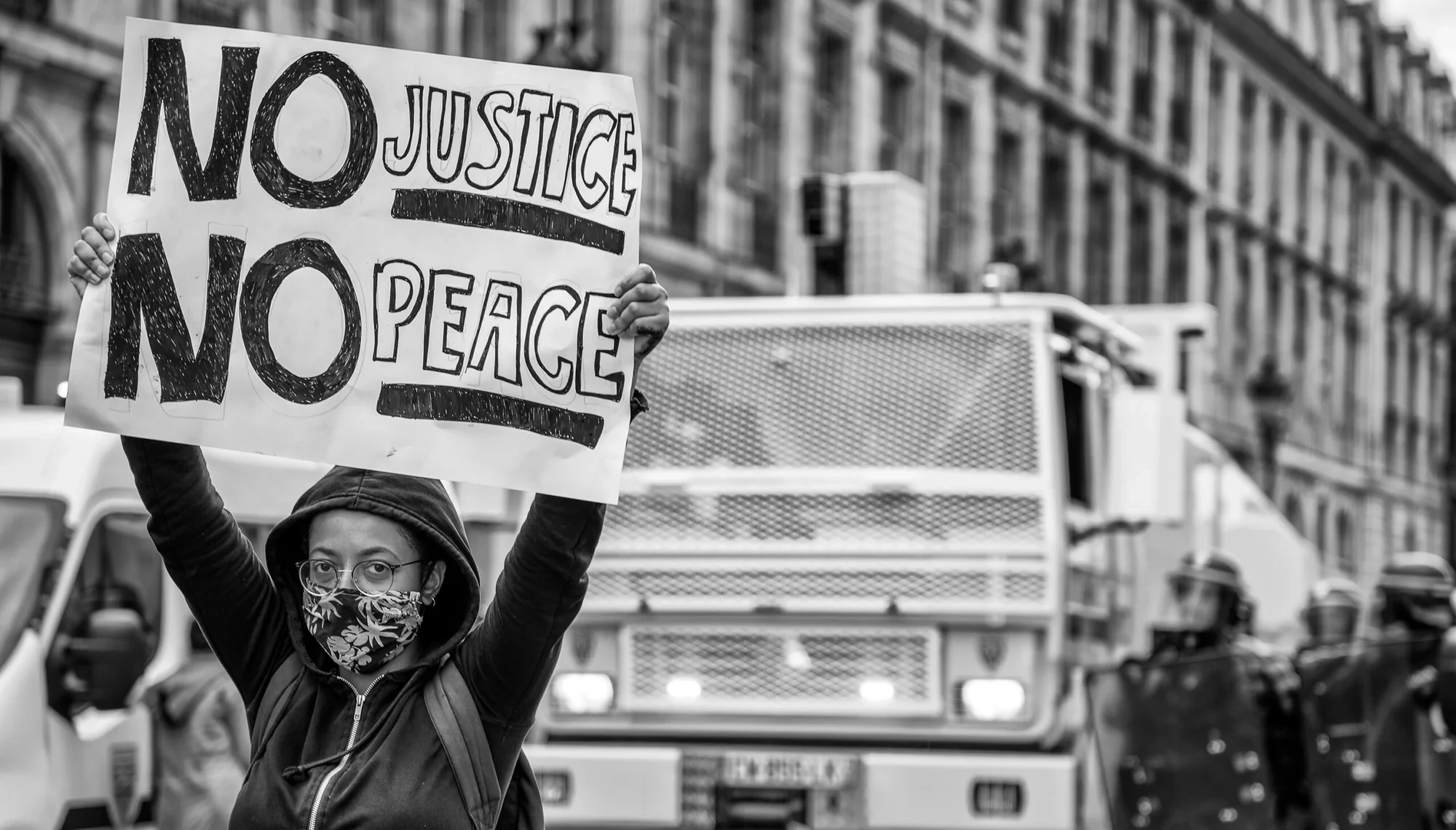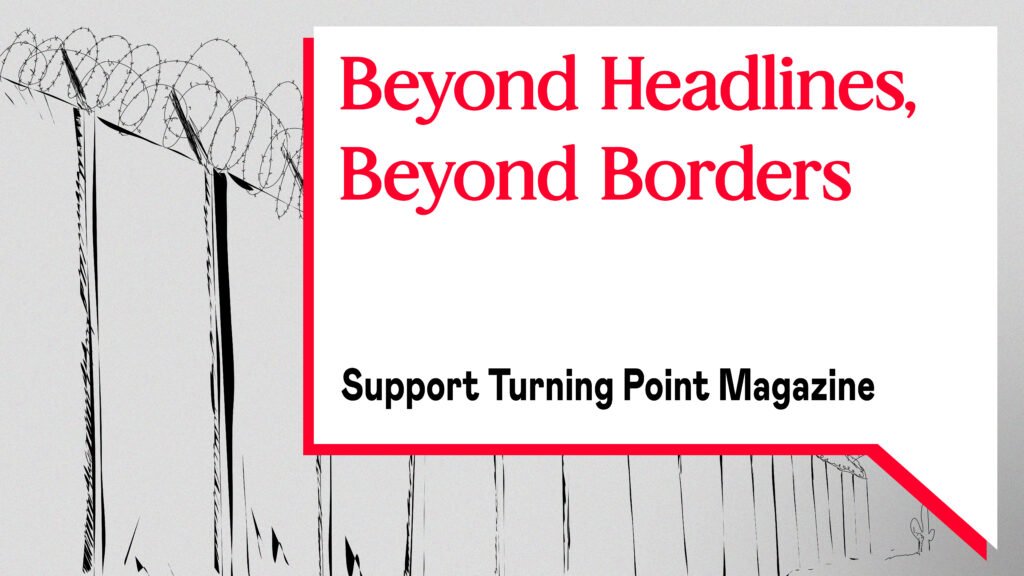Cover photo: © Maryam Ashrafi
In 1968, while the Vietnam War was raging, theater director Peter Brook shot a documentary movie about how British society perceived the ongoing war. Tell Me Lies is the story of Mark and Pauline, an average white, middle-class British couple who are shocked by the image of a Napalm-mutilated child in Vietnam. After seeing the picture, the realization of the Western armies’ atrocities strikes them, and the documentary follows the two asking themselves and others what they can do to stop the war.
In the past months, a scene from this movie resurfaced among various social media platforms, such as TikTok, YouTube shorts, and Instagram reels. The viral clip shows Kwame Ture, a prominent intellectual and activist in the Black Power movement, answering questions by the protagonist couple on how to achieve peace: “There’s a difference between peace and liberation, is there not? You can have injustice and have peace. Isn’t that correct?” Ture asks back to Pauline who agrees. “So peace isn’t the answer, liberation is the answer.”
It is not a coincidence that this bit of conversation started circulating again at this moment. In a world descending towards wars and genocides, more and more people, including on the Turning Point Editorial Board, feel a strong need to discuss peace, and Ture’s speech summarizes the answers to many questions raised by this common desire. Does the word peace have any meaning? Not without justice, is the powerful lesson of the Black Power movement.
As zones of conflict spread, becoming more and more internationalized, the likelihood of achieving long-lasting solutions is critically reduced. The role of the United Nations in peacekeeping has largely failed: there have been no new major deployments of UN peacekeeping forces since 2014—despite the world facing the highest number of armed conflicts since World War II. Even though in some situations the so-called Blue Helmets provided a sense of stability, their presence has not brought peace to people suffering from wars and their consequences.
According to SIPRI Yearbook 2024, global military expenditures reached approximately $2.4 trillion in 2023, driven by ongoing geopolitical tensions—such as those seen in Ukraine and Gaza. This represents a 6.8% annual increase, marking the largest rise since 2009. These numbers show that states are more focused on how to engage in conflicts than finding solutions to the existing ones.
The re-emergence of Ture’s position in our current moment should be taken as a clarion call. It compels us to confront uncomfortable truths about our complicity in systems of oppression and recognize that silence in the face of injustice is itself a form of violence. The failure of top-down peacekeeping efforts, exemplified by stagnating UN interventions, underscores the necessity for grassroots movements that prioritize liberation over superficial armistice agreements. As we raise our voice to impose a ceasefire in Israel we have to confront the fact that this won’t amount in Palestine’s freedom: there’s a huge difference between a mere absence of tanks and bombings and a free life.
In this critical moment, we cannot let ourselves drown in powerlessness, we need to channel our outrage into action. This is true for everyone, especially those living in Europe: armed conflicts are tearing the world apart, but this torment is far from equally distributed. In fact, it is the so-called Global South that feels the full impact of war, as the most violent conflicts and the consequential destruction of natural and social resources that come with them, are taking place in those countries. We chose articles that analyze Europe not only because it is the continent where we are based, but also to underline the responsibility that we have as societies in this part of the world: we need to change how we live in order to stop surviving at the expenses of others all over the world.
Liberation requires solidarity across borders and communities, demanding that we dismantle the structures that perpetuate inequality and violence. As we engage with these pressing issues, let us remember that our quest for justice is not just a response to current events but a continuation of the struggles fought by those before us.
We will open our reflection about this with the article about the current situation in Northern Ireland, a land where the war ended many years ago but is far from achieving liberation.
The Irish case shows how peace building is not a passive act, nor limited to negotiations between belligerents with blood on their hands. Where governments fail, communities must learn to organize and reclaim initiative. This summer, disinformation set off racist riots that spread across the UK and Ireland, overwhelming authorities and terrorizing locals. In Northern Ireland, gangs associated with Republicanism and Unionism took part in acts of vandalism motivated by the same lies about migrants. Thanks to quick thinking and new attitudes towards an old conflict, local citizens and labor unions set out to physically interdict the fascists. As threats from the far-right evolve globally, civil society needs to be quick on its feet. Every challenge can be a learning opportunity.
A dialogue between Ronja Malstrom and Joshua Clover about his book Riot. Strike. Riot: The New Era of Uprisings will take us through the different ways people are struggling for justice, and for peace, today as well as in history. Disruptive practices like occupations and barricades, blockades, and riots, are conceptualized as part of a strategy for radically changing society.
In the liberal and colonial worldview, peace is willingly mistaken for being “peaceful,” and this deception is used against struggles and movements all over the world. We want to contribute to breaking this shallow idea by publishing an analysis of the criminalization of peaceful protesters in Europe. As recent cases from Germany, Italy, and other countries show, peaceful means of protest are repressed and criminalized even when fighting for causes that states themselves are legally obliged to pursue—such as preventing genocide or halting climate breakdown.
“For activists, NGOs, and civil society, mounting restrictions underscore a stark truth: defending human rights increasingly means sacrificing personal freedom,” Gaia Guatri concludes in her article. Peace movements, migrant rescuers in the Mediterranean, and environmentalist groups are facing an increasingly hostile justice system across the EU. The Council of Europe has warned that the escalating criminalization of non-violent protests poses a direct threat to free speech and peaceful assembly in the union.
However, “as authorities clamp down, grassroots groups and NGOs remain resilient and interconnected in building solidarity networks across borders to amplify their demands and unify their struggles,” Guatri concludes. “Solidarity, in this climate, is not only a strategy but a necessity to safeguard the fundamental rights of each of us.”
This month’s issue aims to shed light on the possibility of a less cruel world, and as an editorial board, we are convinced that in order to reach our aim, we must follow the path of resistance and liberation.





